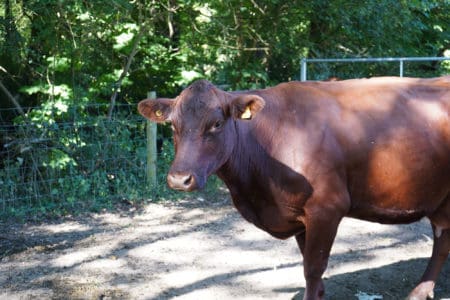Forty Hall Farm Cows Graze at Wildlife Trusts’ Nature Reserves
Thanks to the The Wildlife Trusts, eleven of our Red Poll cows and calves have been temporarily transported from Forty Hall Farm to a nearby nature reserve in Essex, where they will be able to graze freely on the land until the end of October. In addition, we are also participating in a new grazing trial with our Saddleback and Tamworth pigs at a nature reserve near Ware in Hertfordshire.
Red Poll cattle are the original breed of this area and are supported through the Rare Breeds Survival Trust. The cows have been specially chosen because of their natural grazing techniques to help improve the current state of the reserve, which is overgrown with long grass and shrubs.
Cattle are particularly useful for conservation grazing as they use their tongues to pull out tufts of vegetation instead of grazing close to the ground, like sheep.
Their wide mouths also mean they do not graze selectively and, as a result, they do not target flower heads and herbage which is important for botanically diverse habitats. The cattle are able to create their own access into rough areas and the trampling of these areas can be an important way of controlling the shrubs. Grazing is limited to the time after plants have flowered and reseeded, and when ground nesting birds have reared their young.
Forty Hall Farm Manager, Angelika Hauses, said: “We are really grateful for this opportunity as it brings huge benefits to our farm, the cattle and The Wildlife Trusts’ nature reserves.
“The cows will help keep the grass and shrubs short to encourage open spaces and an increase in biodiversity, while the land on our farm will have time to re-grow ready for grazing again when they return. It also allows us time to support other crucial farming activities such as hay-making.
“In addition to our cattle, some of our pigs (Saddlebacks and Tamworths) have been introduced to a former gravel pit at a nature reserve near Ware to smooth out the edges and keep vegetation down.
“Pigs can be quite destructive to the vegetation. Not only do they eat the green shoots, they also dig out the roots. In this case, this is exactly what the Wildlife Trusts are trying to achieve. Passing wading birds will only come down to settle when they see open spaces and brown earth to pick worms and insects. The pigs are doing a good job and the public can now enjoy some farm animals, as well as the many birds that call the reserve their home or are passing through.”
The Wildlife Trusts are a federation of 46 independent wildlife conservation charities covering the whole of the UK. They are committed to protecting wildlife and inspiring a lifelong love of nature. They also manage nature reserves and discovery parks across the county, providing outstanding outdoor education and preserving places of wonder.
Farmers have an important role to play as custodians of the British countryside and wildlife, as well as providing the science and art of cultivating plants and livestock.
Capel Manor College offers a diverse range of full and part-time agriculture courses in London for young people and adults looking to start a successful farming career.
We help students gain first-hand farming experience by taking part in projects like these at our certified organic Forty Hall Farm, helping them develop the practical skills and knowledge needed to progress to higher education or a career in farming.




